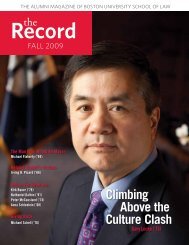the nature of representation: the cherokee right ... - Boston University
the nature of representation: the cherokee right ... - Boston University
the nature of representation: the cherokee right ... - Boston University
You also want an ePaper? Increase the reach of your titles
YUMPU automatically turns print PDFs into web optimized ePapers that Google loves.
132 PUBLIC INTEREST LAW JOURNAL [Vol. 15<br />
<strong>right</strong>, <strong>the</strong> full significance <strong>of</strong> <strong>the</strong> delegate <strong>right</strong> depends on how this <strong>right</strong> is viewed<br />
today by politicians and citizens, Cherokees and non-Cherokees, as well as scholars<br />
<strong>of</strong> all stripes. 208<br />
Prior to examining <strong>the</strong> separate delegate <strong>right</strong> challenges, <strong>the</strong> interpretative baseline<br />
concerning Indian treaties and treaty provisions must be established. Doing so<br />
requires looking at how treaties were seen during removal and how <strong>the</strong>y are<br />
generally regarded today.<br />
In 1829, John Ross wrote, “[t]he General government has too much respect for<br />
<strong>the</strong> Treaties to let <strong>the</strong>m be violated.” 209 By 1836, Ross’s tone had darkened, yet a<br />
hint <strong>of</strong> <strong>the</strong> earlier esteem in which he held treaties could still be found in his<br />
writing: “It was at one time thought that <strong>the</strong> United States never could declare she<br />
wasunabletokeep<strong>the</strong>Treaties<strong>of</strong>formerdays.” 210<br />
In contrast, Wilson Lumpkin<br />
viewed treaties less favorably: “Look at your large volume <strong>of</strong> Indian Treaties!<br />
What do you <strong>the</strong>re see? One recorded farce after ano<strong>the</strong>r, couched in language <strong>of</strong><br />
high <strong>of</strong>ficial and formal mockery!” 211 Jackson expressed similar sentiments, stating,<br />
“I have long viewed treaties with <strong>the</strong> Indians as an absurdity.” 212 The Cherokees’<br />
failed resistance to removal arguably supports <strong>the</strong>ir more pessimistic perspective.<br />
Jackson and Lumpkin’s dismal take on Indian treaties defined <strong>the</strong> removal era<br />
rhetorically. Yet, <strong>the</strong> fact that <strong>the</strong> U.S. continued to deal with Indians even during<br />
this period through treaties, suggests that in practice and policy some <strong>of</strong> Ross’s<br />
early esteem continued to be justified.<br />
Indian treaties played a significant role in U.S. expansion and continue to define<br />
many <strong>of</strong> <strong>the</strong> characteristics <strong>of</strong> <strong>the</strong> U.S. relationship with Indian tribes. Between <strong>the</strong><br />
first US treaty (with <strong>the</strong> Delawares in 1778 under <strong>the</strong> Continental Congress) and<br />
<strong>the</strong> end <strong>of</strong> <strong>the</strong> treaty period in 1871, “<strong>the</strong> federal government made over 370<br />
208<br />
When thinking about <strong>the</strong> possibility <strong>of</strong> a Cherokee delegate, it is important not to<br />
jump to conclusions about who will materialize in support or in opposition to <strong>the</strong><br />
Cherokee nation. For example, while Republicans have, in <strong>the</strong> past, limited <strong>the</strong> role <strong>of</strong><br />
non-voting delegates generally (where such territorial or DC delegates tend to be<br />
Democrats), <strong>the</strong> fact that Cherokees vote Republican could mean that Republicans push<br />
for a Cherokee delegate.<br />
209<br />
Letter from John Ross and George Lowrey to <strong>the</strong> Cherokee People (July 1, 1829),<br />
in 1THE PAPERS OF CHIEF JOHN ROSS, supra note 14, at 166.<br />
210<br />
Memorial from Cherokee Delegation headed by John Ross to <strong>the</strong> U.S. Senate and<br />
House <strong>of</strong> Representatives (Jun. 21, 1836), in 1THE PAPERS OF CHIEF JOHN ROSS, supra<br />
note 14, at 447.<br />
211<br />
Wilson Lumpkin, Senate Speech (Apr. 30, 1838), in PRUCHA, supra note 17, at<br />
162. Lumpkin expressed similar critiques <strong>of</strong> treaties as mere expediencies and not<br />
meaningful agreements on many occasions. See, e.g., Wilson Lumpkin, Speech at<br />
Committee<strong>of</strong> <strong>the</strong> Whole House (May 1830), in 1LUMPKIN, supra note 3, at 83 (“The<br />
practice <strong>of</strong> buying Indian lands is nothing more than <strong>the</strong> substitute <strong>of</strong> humanity and<br />
benevolence, and has been resorted to in preference to <strong>the</strong> sword [for getting rid <strong>of</strong><br />
Indians] . . . .”).<br />
212<br />
LetterfromAndrew Jackson to <strong>the</strong>n President Monroe (1837), in NORGREN, supra<br />
note 40, at 80.









